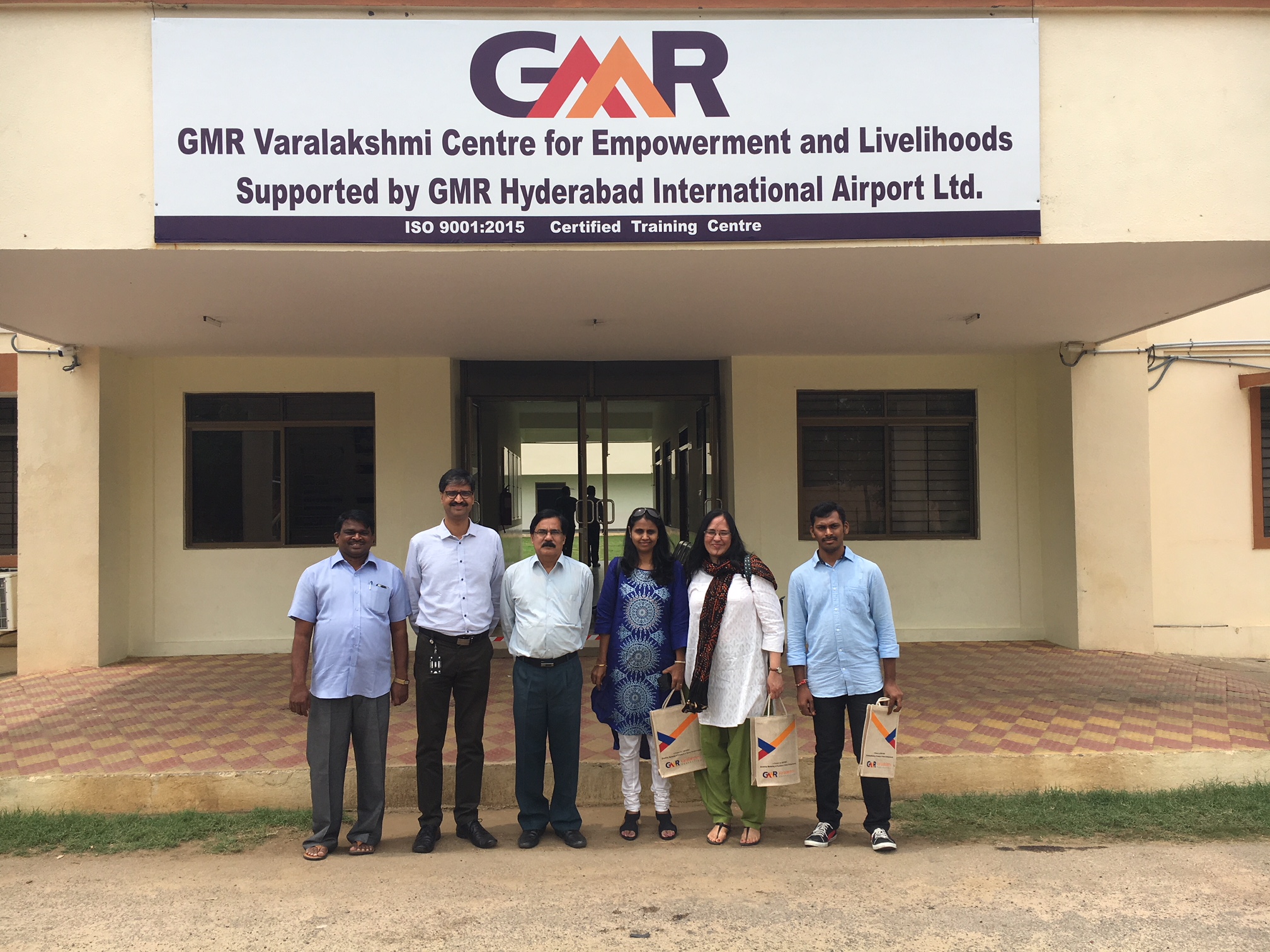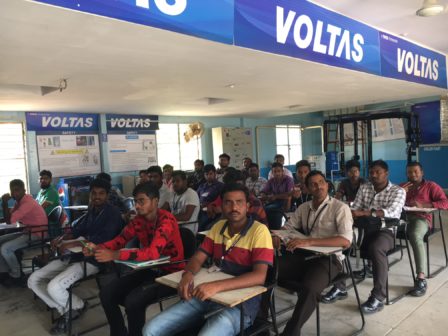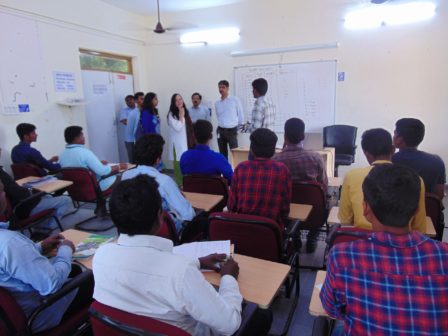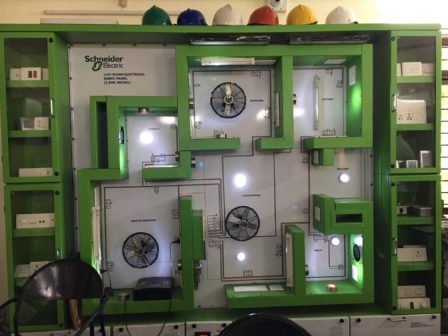The NSN team visited the GMR Varalakshmi Foundation (GMRVF) centre in Hyderabad to interact with the students and trainers and learn about how practical training is delivered on the premises. The campus, located close to Rajiv Gandhi Hyderabad International Airport presents a serene environment to learn many skills in a practical set up. The highlight was the strong industry support and connection in every sector that they are providing training programs in.
Women working on jute bags to fulfill a big international order, girls learning IT skills to realize their dreams of a corporate job, experienced gardeners waiting to be certified under RPL, boys curiously learning motor mechanic skills, welding skills, electrical skills, and many more under trained instructors presented a vibrant set up of many vocational skills being imparted along with residential facility for the boys. Read on to know about the work they do, their industry partnerships and future plans.
GMRVF is the Corporate Social Responsibility (CSR) arm of the GMR Group. The Foundation has the mandate to work with under-served sections of communities around the areas of business operations. GMRVF works in the areas of Education; Health, hygiene and sanitation; Empowerment and livelihoods; and Community development. Currently, GMRVF is working in 25 locations across India, and also supports activities in Nepal.
GMRVF has 13 training centres across the states of Andhra Pradesh, Telangana, Karnataka and Madhya Pradesh. They have been providing training across sectors in several areas including Electronics and Hardware, Beauty and wellness, Automotive, IT&ITES, Construction and earth moving, Apparel and Home Furnishing, Retail etc. Candidates leave the Centres technically trained and certified, ready for the world of work, with placement offers in hand. They are assets to their families and the community.

GMRVF, as part of its contribution to the ‘Skill India’ Mission of the Government of India, has been involved in skilling youth for close to 15 years. This journey began in 2003 with one centre in Srikakulam district, AP. Today, GMRVF is associated with 13 training centres.
GMRVF has trained more than 50,000 youth by end of 2017. Every year more than 7000 youth get skilled with close to 80% of them getting settled in wage or self-employment.
GMRVF is currently associated with PMKVY under a ‘Special Project’ for training 10,000 youth in three years. It is also undertaking an ‘RPL’ programme to orient and help in certification of 2000 housekeepers and gardeners for Delhi and Hyderabad Airports in partnership with DIAL (Delhi International Airport Ltd) and GHIAL (GMR Hyderabad International Airport Ltd)
Best practices followed by GMRVF for skilling
GMRVF over the years has evolved several good practices to deliver quality skilling for school and college dropout youth. For the last few years it has also partnered with govt. programmes to be a part of the ‘Skill India’ mission. GMRVF has always endeavoured to set benchmarks, rather than to just meet scheme requirements. Whether standardized processes, industry partnerships, curriculum and pedagogy, infrastructure, labs or extra inputs like soft skills and job readiness, GMRVF has been working on all these. Some of the significant best practices are shared below:
Industry Partnerships
 GMRVF has strategically entered into industry partnerships for making the training and trainees market-relevant. Updated curricula, content, training of trainers, delivery, equipment, joint certification as well as support in placements are some of the outcomes of such partnerships. Some of the key industry partners include Voltas, Schneider, Volvo, Maruti, CELEBI, Gyproc, etc. This has been the USP of GMRVF skilling programmes and have created a win-win for both the trainees and the company. Other industry partnerships are Jain Irrigation, TBSS, VLCC, BIG C, BOSCH, etc.
GMRVF has strategically entered into industry partnerships for making the training and trainees market-relevant. Updated curricula, content, training of trainers, delivery, equipment, joint certification as well as support in placements are some of the outcomes of such partnerships. Some of the key industry partners include Voltas, Schneider, Volvo, Maruti, CELEBI, Gyproc, etc. This has been the USP of GMRVF skilling programmes and have created a win-win for both the trainees and the company. Other industry partnerships are Jain Irrigation, TBSS, VLCC, BIG C, BOSCH, etc.
Market Responsiveness and Flexibility
 GMRVF centres keep an ear to the ground taking feedback both from the employer, trainees. GMRVF also monitors placement and retention data, career growth, etc. of its trainees to be fully responsive to what the market needs and accordingly change the course menu, the curriculum or other inputs. Some of the ways which make this operational are outlined below:
GMRVF centres keep an ear to the ground taking feedback both from the employer, trainees. GMRVF also monitors placement and retention data, career growth, etc. of its trainees to be fully responsive to what the market needs and accordingly change the course menu, the curriculum or other inputs. Some of the ways which make this operational are outlined below:
- Constantly striving to start new and market needed courses with industry partners. At the same time, there is flexibility to stop any course based on market demand and/or student aspirations. Like Beautician course with VLCC was stopped after several batches were conducted resulting in constraints at both demand and supply side.
- The scope of the course is enlarged for better employment opportunities. When feedback on course on Micro-irrigation was that employment was seasonal, plumbing was added to the course and trainees now have better placements.
- There is a feedback mechanism at both trainee level and employer level. Trainees give feedback during training, at the end of the training as well as post-training.
Process Orientation
- Standard Operating Manual (SOP) covering all operations of the centre developed and reviewed on regular basis
- Standardized day-wise curriculum, evaluation and assessment formats, trainer and trainee handbooks – all compiled in a Dossier for each course
- Tracking of passed out candidates for 6 months to a year
- Alumni Meet of passed trainees
- Hyderabad centre has been certified with ISO-9001,2015 certification as a testimony for the processes oriented training undertaken
- Other processes such as 5S, Kaizen regularly undertaken at centres to orient trainees to such industry practices and to imbibe these from the start
 Use of Technology
Use of Technology
- A mobile app has been recently developed exclusively for enhancing skill training reach of GMRVF. It can register candidates, employers, take feedback from employers, alumni, get candidates referred, etc.
- In conducting courses also, use of technology is encouraged. Like for driving training, ‘simulators’ are used. Similarly for Welding, ‘AR – Augmented Reality’ simulator is used. Now for RAC course, an Inverter AC Simulator is being added. These help in saving cost as well as enhancing training quality and rigour.
- Use of social media for mobilization as well as for spreading success stories for inspiration.
On-the-Job Training and Exposure Visits
Several of the courses conducted at GMRVF centres have a component of on-the-job training, and all the courses have a component of exposure visits built in the schedule. For example, the RAC course has two components – 3 months training at the centre plus 45 days OJT at one Voltas dealer. Similarly for Solar and Retail course there are 2 weeks of OJT in operational settings. These inputs provide good exposure and learnings in terms of real-work environment
Click here to read the student testimonials from GMRVF.
Skill related ‘Live Projects’
Towards the last fortnight of the course, trainees are allocated to work on ‘live projects’. For example, the welding trainees may work on making school benches, electrical trainees on local govt. school electrification, repairs, or even laying electrical lines, fixing switches, fans, etc. Service camps are organized for employees by trainees of courses like two-wheeler repair or mobile repair. This helps the trainees to get live exposure for actual work in terms of trouble shooting, customer interface, etc.
Quality Infrastructure
GMRVF believes that the infrastructure provided should be the best-in-class. The message from the top management has been very clear that the facilities created for skilling should be matching to the airports or business levels of GMR group. Considerable investments are done upfront to provide quality infrastructure. Considerable budget is provisioned for maintenance of the building and related infra also.
Mobilization Strategies
The methods followed by GMRVF for good mobilization are as follows:
- Defining the right target group
- Community-level mobilization by GMRVF
- Through other NGOs
- News snippet in local editions
- Employee references
- Word of mouth
Strategies for Retention of Students during training
- Residential model of training
- Stress on soft skills, yoga, spoken English, etc
- Swa-daan – a structured giving-back practice by trainees.
- Accident insurance for trainees
Strategies for Enhanced Placement Opportunities
Apart from having industry partnerships where the industry partner helps in facilitating placements of the trainees, there are several other pro-active measures taken to prepare the trainees better for placements. Some major ones are given below:
- Preparing for Interviews
- Tie-ups with placement agencies
- Interfacing and fulfilling requirements of Contractors in GMR Projects
Upcoming innovations
- GMRVF is now planning to start 100% post-placement tracking record through IVRS for all passing out trainees at intervals of 1 month, 3 months, 6 months and 9 months. There will an automated call to the trainee asking his status in terms of working, not working, if not why, salary if working, etc. There will be a record of all calls made and corresponding status of trainees.
- Development of standardized E-soft skill module available as an aid to soft skill trainer at each centre with over 100 hours of content. While the module is already available as a training resource, this is being developed as a digital content with to standardize as well as provide good support to the faculty.
- Standardized whatsapp text, audio and video based spoken English delivery for anytime anywhere access approach to English learning with a 90 day module.












